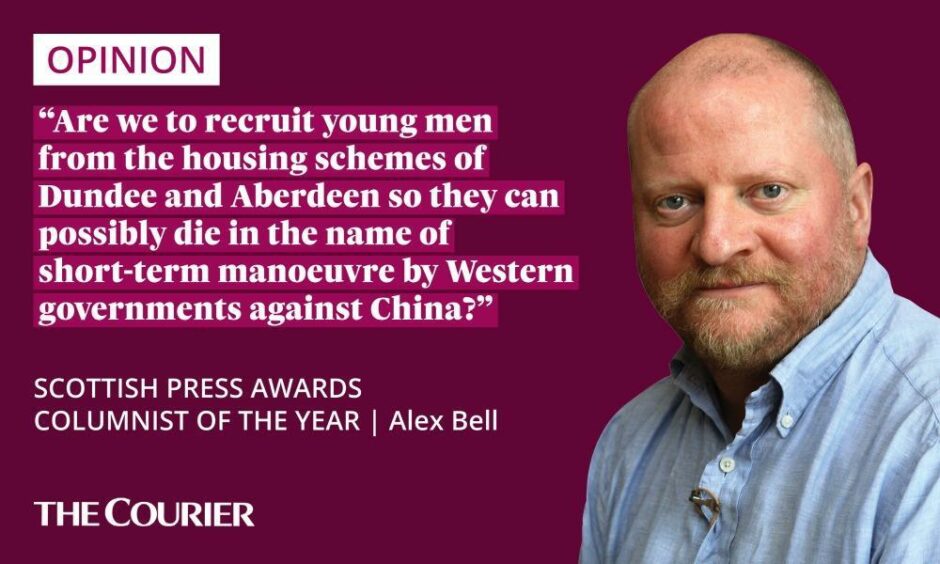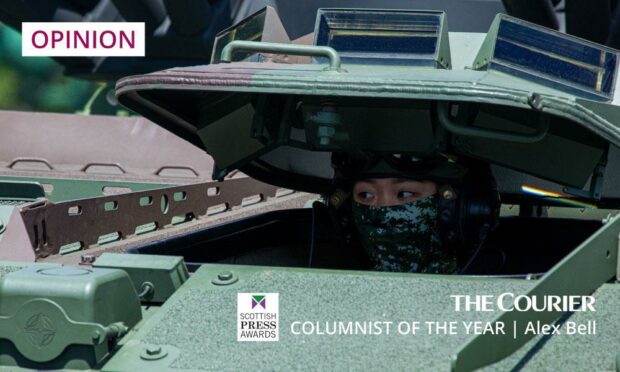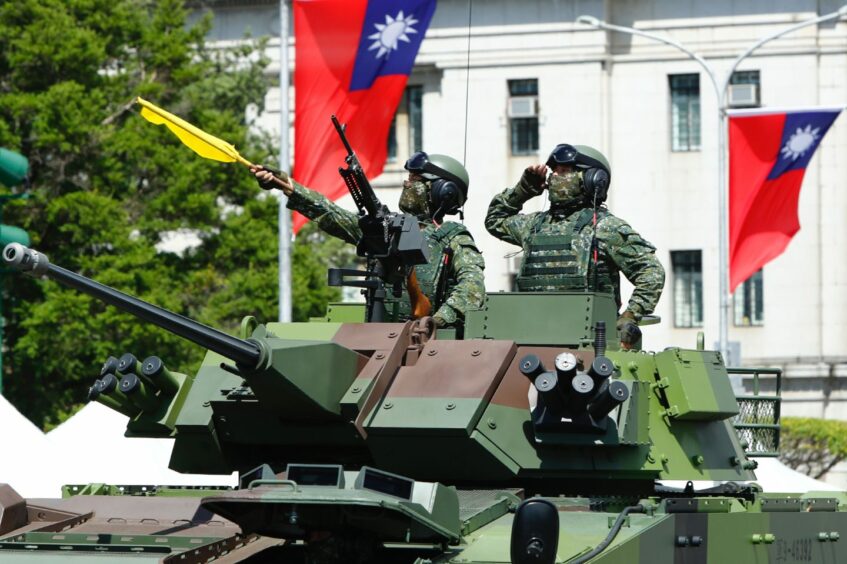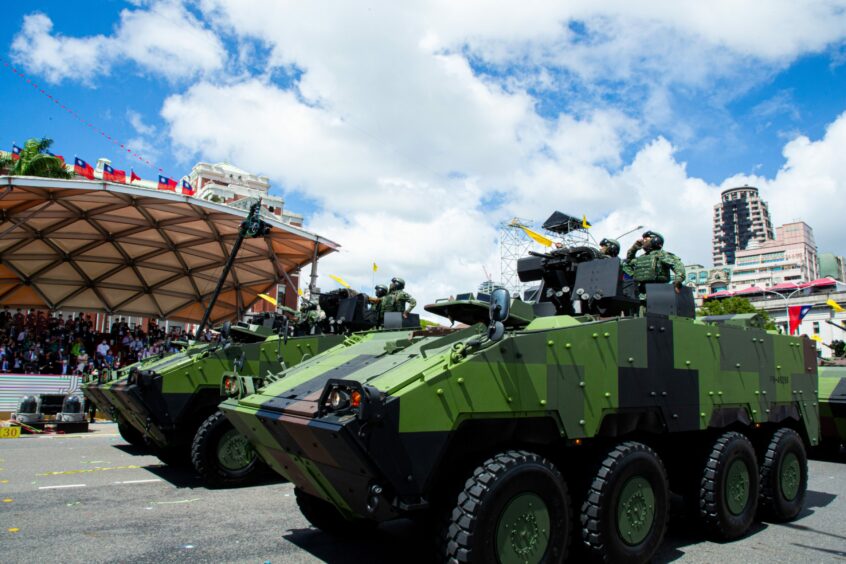Made in Taiwan was a cliche of the 1980s. Lots of stuff had this message stamped on it, indicating the decline of western manufacturing and the rise of cheap labour in the east.
Now things are made in China, possibly including the world’s next war.
President Xi of China is gathering war planes and equipment close to Taiwan.
Beijing is clear it wants the island back as part of a united China.

“Those who forget their heritage, betray their motherland and seek to split the country will come to no good,“ president Xi said.
Taiwan and mainland China separated 70 years ago.
For Xi, this is still an act of betrayal.
Ironically it was the nationalists in the Chinese revolution who ended up offshore.
They now face the nationalist desire for territorial completion from Beijing.
This week Taiwan celebrated its National Day with a parade of tanks and defiant speech from leader President Tsai.
She hoped for “an easing of cross-strait relations”, saying Taipei will not “act rashly,” but stressed “there should be absolutely no illusions that the Taiwanese people will bow to pressure”.
She went on: “We will continue to bolster our national defence and demonstrate our determination to defend ourselves in order to ensure that nobody can force Taiwan to take the path China has laid out for us.”
So why should Taiwan matter to us now?
Scots didn’t care about getting cheap stuff from Taiwan 40 years ago. It’s moot if we should care about China occupying Taiwan.
Washington and London are bracing us for some kind of fight in the South China Sea.
The spin is that the integrity of all nations is threatened if an aggressor is allowed to occupy a free state.
Stand back and it’s appeasement.
The UK, Australia and the USA are forming a new trilateral defence partnership that will preserve security and stability around the world.
It will also create hundreds of high-skilled jobs across the country, driving forward our levelling up agenda.#AUKUS https://t.co/W1MibdaBDc
— Boris Johnson (@BorisJohnson) September 16, 2021
That argument has an historic resonance. It fits in with our idea of nations and geopolitics.
We are meant to go to war over land grabs.
What’s more, we are meant to defend democratic states against autocratic ones.
Again, it’s what we do.
But in both instances, we do it badly and hypocritically.
London has signed a new defence pact with America and Australia aimed at deterring China.
Which is to say, one great colonial power has teamed up with two examples of European settlement on others land in order to defend the right of natives.
World order is at stake
That may seem a standard liberal critique. A piece of right-on analysis. But it is important.
The west’s sense of what matters is entirely confected out of our own greed and self interest.
More simply, if China was the democratic state and the island of Taiwan the autocratic one, we’d be encouraged to think an invasion from Beijing a good idea.
Real politic suggests none of this matters.
Foreign policy is doing the best thing in a turbulent world to broadly keep order in favour of the rich.
Thus an attack on Taiwan is a bad thing to tolerate – where next?
It also is a slap in the face of western power – don’t look weak.
In short this isn’t about principles and it’s got nothing to do with China’s long memory for its land.
It is about a more immediate need to not loose grip on world order.
But should we care if China does what superpowers do in order to restore an historic border?
Russia invades Crimea and we fret, but don’t go to war.
Britain retains its outposts. In the 1980s we fought to win back the Falklands. It seems highly doubtful we would do so again.
We would not get involved in the Kashmir dispute if Pakistan invaded or between India and China in their border tussle.
So why should we posture as if we’d fight for Taiwan?
Are we to recruit young men from the housing schemes of Dundee and Aberdeen so they can possibly die in the name of short-term manoeuvre by Western governments against China?
Whose war is it anyway?
The Navy frigate HMS Richmond sailed the Taiwan Straits a couple of weeks ago, in accordance with maritime law, but to the irritation of China.
Beijing accused the British ship of “evil intent” – which is rather the point of a warship.
The question we have to ask is what on earth is London trying to prove.
We messed up in Korea seven years ago, as the USA came unstuck in Vietnam.
What makes us think we can prevail now?
HMS Richmond has sailed through the sensitive Taiwan Strait on enroute to Vietnam to demonstrate freedom of navigation, in a move likely to anger Beijing.https://t.co/w3PLuIHFBc
— UK Defence Journal (@UKDefJournal) September 27, 2021
It is clear that Chinese rule restricts human rights.
The return of Hong Kong has led to a crackdown on democracy and free speech.
The promise to govern Taiwan under a similar “one country, two systems” model will probably also result in uniform repression.
The history of China’s political development isn’t to Western taste, but the strange appeal of restoring old borders and uniting people affects all civilisations, at all times.
Nationalist instincts of things being better if some vague sense of historic destiny is honoured seem hardwired in humans.
It’s far from obvious that we should be involved in someone else’s sense of completion.
ALEX BELL: Cut benefits, blame business – Boris Johnson’s bold move might pay off


